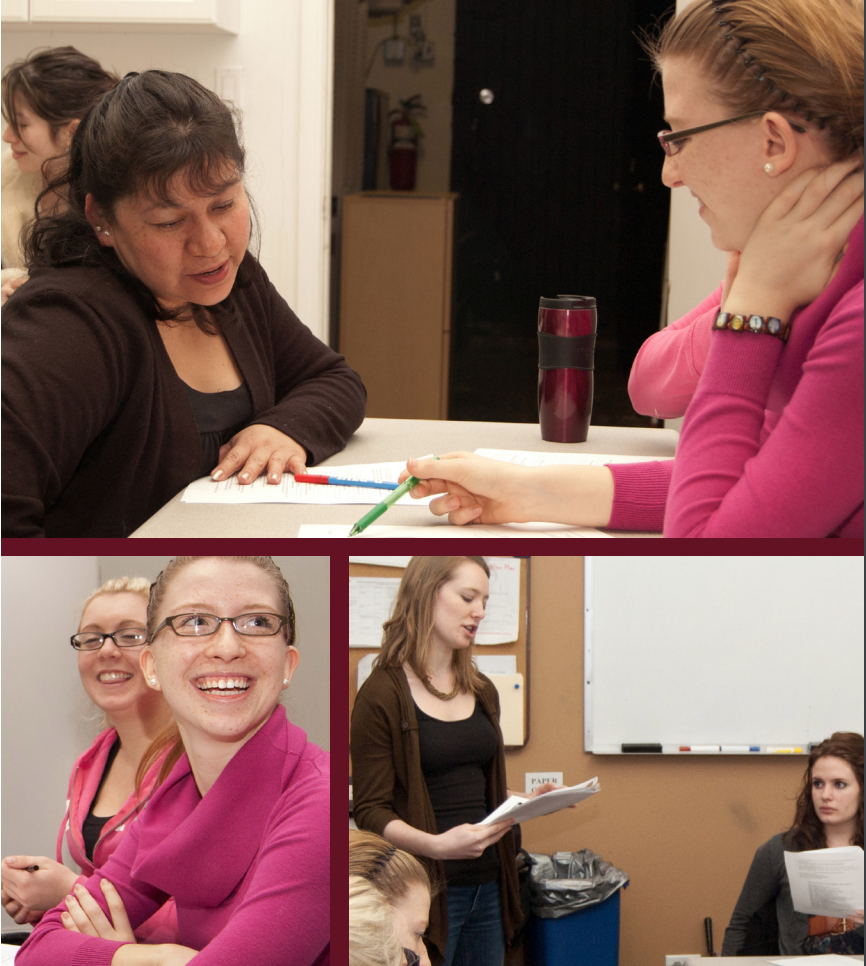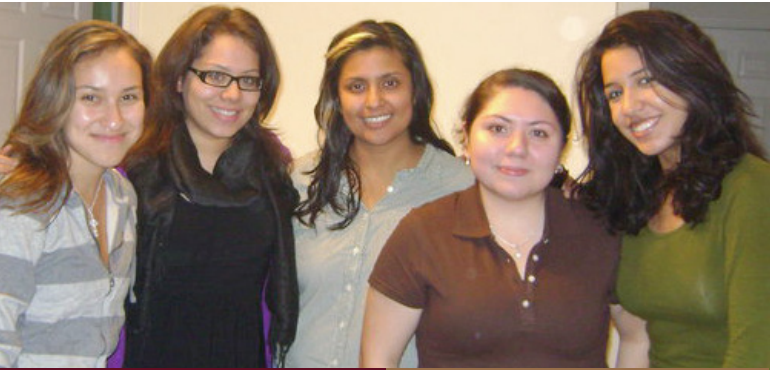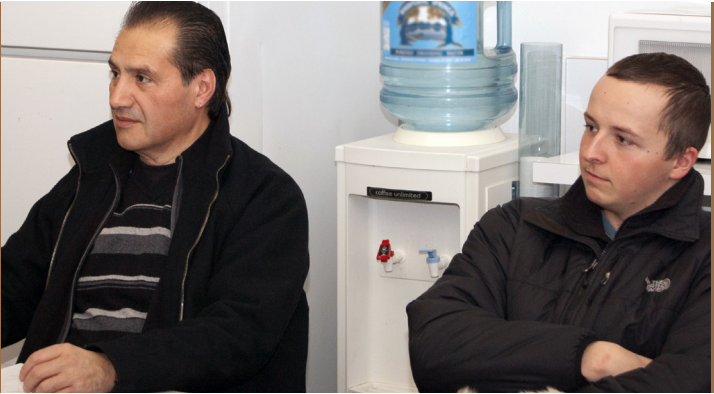 DePaul senior Barbara Obregon is a mentor for Intercambio,
a language exchange program formed through a partnership
between the Steans Center, DePaul’s Department of Modern
Languages and community-based organizations in Chicago. In its
9th year at DePaul, Intercambio is as much about improving language skills as it is a cultural exchange that exposes participants
from DePaul and the community to the differences and commonalities in each other’s lives. Obregon and many others familiar
with the program say that the program brings people from
diverse backgrounds together in a unique fashion. “Intercambio
is not only about language development – we see relationships
forged in this program,” she says. “It feels like we are building
a community.”
DePaul senior Barbara Obregon is a mentor for Intercambio,
a language exchange program formed through a partnership
between the Steans Center, DePaul’s Department of Modern
Languages and community-based organizations in Chicago. In its
9th year at DePaul, Intercambio is as much about improving language skills as it is a cultural exchange that exposes participants
from DePaul and the community to the differences and commonalities in each other’s lives. Obregon and many others familiar
with the program say that the program brings people from
diverse backgrounds together in a unique fashion. “Intercambio
is not only about language development – we see relationships
forged in this program,” she says. “It feels like we are building
a community.”

The program, she adds, has been influenced by
popular education theories developed by Brazilian educator
Paulo Freire that stress collective learning and empowerment
of community members. As they practice their language skills,
participants critically reflect on important social justice issues
occurring every day in Chicago and globally.
The origins of Intercambio date back to a grant from the U.S.
Department of Education’s Fund for the Improvement of PostSecondary Education (FIPSE) awarded to the Steans Center in
2001. The program entails DePaul’s Modern Languages
Department offering an intermediate level, year-long sequence
of Spanish classes with a service learning component. Students
fulfill the university’s Junior Year Experiential Learning requirement which requires that students draw connections between
course content and experiences off-campus.
Obregon, who is majoring in accounting and finance, facilitates the program weekly at Refugee & Immigrant Community
Services (RICS) in the Belmont-Cragin neighborhood on the city’s
northwest side. RICS is part of Heartland Human Care Services,
a subsidiary of Heartland Alliance.

The Intercambio program also operates at
Erie Neighborhood House, Centro Romero,
and Universidad Popular, all organizations that
serve predominantly Spanish-speaking Latino
immigrants. At RICS, Obregon says, many
community members are from Mexico, though
there are participants from Colombia, Peru and
other Central and South American countries.
The ESL students may lack confidence in their
grasp of English, Obregon says, but they typically have a greater grasp of the language than
DePaul students do of Spanish. “Because relationships are formed,” she says, “you are able
to get past preconceptions and prejudices, and
have a dialogue.”
Rebecca Martinez, former Academic and
Community Development Coordinator at the
Steans Center, supervised the Intercambio
program. She says that Intercambio students
have an opportunity to enhance their language
skills while exploring complex social issues
related to classism, racism, ableism and other
forms of oppression. “We ease into issues,”
Martinez says. “As soon as people feel comfortable about it, we talk about specific topics
that affect our community and our world. We
try to create a comfortable space – a space
in which we can have a dialogue.” According
to Martinez, the success of the program is
reflected by more and more students choosing
to participate in Intercambio for the full threecourse sequence.
Ben Dronfield, Manager of Adult Education
at RICS, calls the organization’s partnership
with the Steans Center a “mutually beneficial relationship.” Dronfield states that the
Intercambio program typically serves about
six community residents per quarter at RICS
and DePaul students team up with community
members on a one-on-one basis.
“The program
provides our
students with a
rare opportunity
– the chance to
speak English
conversationally in a learning
environment,”
he says. Like
many people
involved with
the program,
Dronfield stressed that Intercambio creates
a supportive place for DePaul students and
community members to learn. “Intercambio
removes any sense that there is a downside to
making mistakes in the classroom,” he notes.
“In some situations, community members
may be concerned about making mistakes in
a class when learning a language – but that’s
not the case in this program.”
The same is true for DePaul students, says
junior Kyra Cameron. She suggests that “what
you can take from Intercambio is that a lot of
times in the classroom you get really shy when
speaking Spanish and caught up. You ask: Am
I answering this correctly? In Intercambio, you
loosen up a bit. If you make a mistake, it’s
OK.” She says that her Spanish professor last
spring, Bernardo Navia was very supportive of
the program. Navia says that students in the
program “really feel they have learned – not
only by studying books, but by talking with
people in real life.” Cameron participated in
the Intercambio program as a service learner
at RICS last year. Last fall, as a psychology
major who minors in Spanish and community
service, she also volunteered for the program.
She further notes that “people in the community who participated in
the program
taught you
something,
whether it
was a new
word, something about
their culture
or even a
recipe for guacamole. It was a great atmosphere for learning, and I became friends with
many community members.”
Erica Woodson, a senior majoring in international studies who participated at RICS last
fall, says that initially she just “wanted to keep
talking Spanish” after spending her junior year
abroad in Argentina (and previously studying
abroad in Puerto Rico). She claims that the
Intercambio program reinforced the dynamic
quality of Latino communities in Chicago.
“People sometimes view the Latino community
as being homogeneous,” she says, “but you really meet a range of people and hear different
views through this program.” Woodson adds
that “immersion is the best way for me to learn
a language – and in an environment where everyone is learning. A program like this makes
so much sense, and could work on a national
level. In Intercambio, you are giving something
and receiving something.”
Dr. Jacqueline Lazú, one of the original faculty members involved in the FIPSE grant and
who continues to teach courses linked to
Intercambio, speaks of the transformation that
is possible when students learn language in
the classroom and in the community. She says
that even in one quarter “I have seen a transformation among students in terms of their
confidence level. They are acquiring a level of
proficiency, but there is also more to it –
students learn that language cannot be
learned in a vacuum. It’s important to understand the norms of the culture.” Lazú says that
language development is especially crucial as
DePaul students – and community members
served by the program – learn how to disagree
with each other. “Early on, students don’t have
tools to frame a counter-argument,” says Lazú,

who is also Director of the Community Service
Studies Minor at the Steans Center and
Associate Professor of Modern Languages.
“They may disagree but they can’t communicate what they want to say. By engaging in
conversation, students learn how to do that.”
She adds that a textbook used for the class
complemented the methodology used in
Intercambio. The textbook employs exercises
that include reference to social issues that
can be discussed by students and community
residents.
The educational impact of Intercambio
over the past decade is reflected in years of
positive program evaluations and numerous
stories relayed by Spanish language faculty
and Steans Center mentors. Like all service
learning courses, the program is also
assessed quarterly through quantitative
and qualitative evaluations attained from
students, faculty and community partners.
Until recently, less was known about the
perspective of community members. In
2009, however, based on interviews with
Intercambio community participants, Dr. Lucia
d’Arlach (Mt. Sinai Hospital), Dr. Bernadette
Sanchez (DePaul) and Rachel Feuer (DePaul)
published “Voices of the Community: A Case
for Reciprocity in Service Learning” in the
Michigan Journal of Community Service
Learning (Fall 2009). The authors note how
community members reported “changing
views of university students (i.e., from
admiring them to seeing them as imperfect
equals), changing
views of themselves
(i.e., from feeling
helpless to finding
a voice), as well as
changing views of
social issues (i.e.,
from impossible to
solvable).”
Findings such
as those above
continue to be a
part of Intercambio’s success in the community. Recent participant Felix Delgado, who
came to the United States from Mexico twelve
years ago, works in the computer technology field for a company in Des Plaines, IL.
He learned about Intercambio from a cousin
who participates in the program. “My English
has improved a lot,” says Delgado, who lives
in the Belmont-Cragin community and has
participated in the program for two years.
“Students at DePaul are very good at helping us with pronunciation and new words.”
Delgado adds that the program offers him the
chance to learn language skills through conversations about a variety of subjects. “Every
class is something different. We not only have
casual conversations, but we also talk about
things that are helpful to know or learn more
about -- like discrimination, global warming or
education, or problems in the community. We
also learn about the culture of other people
– what are their customs, what they do. I’m
learning a lot, and it’s fun.”
Elvia Zagal, who lives in the Portage Park
community on Chicago’s North Side and
works in a hotel in downtown Chicago, has
also been involved in Intercambio for two
years. She emphasizes that Intercambio is
not just about what happens one night a
week at RICS. “At the end of one quarter
we continued to share our culture and learn
about other cultures. We went to different
restaurants in the city with DePaul students
– including Mexican, Colombian and Chinese
restaurants. We also talk on Facebook, and
in emails,” says Zagal, who has two teenage
children. “We are comfortable with each other
– everybody knows everybody. I don’t have to
speak perfect English, and they don’t have to
speak perfect Spanish. She offers a concise
view of how, and why, DePaul students and
community members form a bond and benefit
from this program – a view that many at
DePaul have shared. “They ask us, and we
ask them,” she says. “We learn together.”